
"Suffragette City" is a song by English singer-songwriter David Bowie. It was originally released in April 1972 as the B-side of the single "Starman" and subsequently appeared on his fifth studio album The Rise and Fall of Ziggy Stardust and the Spiders from Mars (1972). The song was later reissued as a single in 1976, with the US single edit of "Stay" as the B-side, to promote the compilation album Changesonebowie in the UK. Co-produced by Bowie and Ken Scott, it was recorded by Bowie at Trident Studios in London with his backing band the Spiders from Mars, consisting of Mick Ronson, Trevor Bolder and Mick Woodmansey, at a late stage of the album's sessions. The song was originally offered to English band Mott the Hoople, who declined it and recorded Bowie's "All the Young Dudes" instead. It is a glam rock song that is influenced by the music of Little Richard and the Velvet Underground. The lyrics include a reference to Anthony Burgess' novel A Clockwork Orange and the famous lyric "Oooohh Wham Bam, Thank you, Ma'am".

Sophisticated Boom Boom is the debut studio album by English pop band Dead or Alive, released on 20 April 1984 by Epic Records. Featuring mostly synth-pop and dance elements, the album contains the band's first UK Top 40 single, a cover version of KC and the Sunshine Band's "That's the Way ". That song, along with "Misty Circles", were hits on the US Hot Dance Music/Club Play chart. The album was a minor success in the UK where it peaked at No. 29.
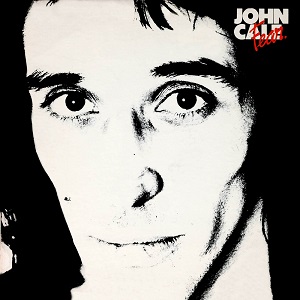
Fear is the fourth solo studio album by Welsh rock musician John Cale, released on 1 October 1974 by Island Records.

The Black Album is the fourth studio album by English punk rock band the Damned, and the first to feature Paul Gray on bass guitar. It was released on 3 November 1980 by Chiswick as a double album, with "Curtain Call" filling the whole of side 3, and a selection of live tracks recorded at Shepperton Studios at a special concert for Damned fan club members on side 4. The song "13th Floor Vendetta" paid tribute to the film The Abominable Dr. Phibes (1971), opening with the lyrics "...the organ plays to midnight on Maldine Square tonight".
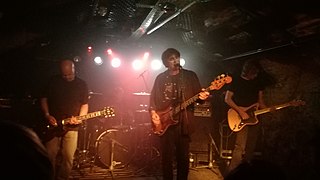
The Chameleons are an English rock band, formed in Middleton, Greater Manchester in 1981. The band's classic line-up consisted of lead vocalist and bassist Mark Burgess, guitarists Reg Smithies and Dave Fielding, and drummer John Lever.

Strange Times is the third studio album by English rock band the Chameleons. It was released on 1 September 1986 in the United Kingdom, and on 29 September 1986 in the United States, by Geffen Records. Initial copies of the North American vinyl release included a bonus LP featuring six non-album tracks, which would later be included as bonus tracks on the CD release in 1993. Two singles were released from the album: "Tears" and "Swamp Thing".
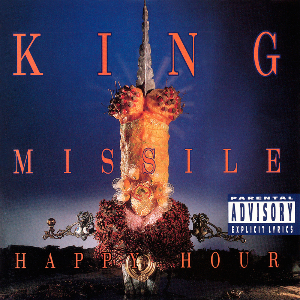
Happy Hour is the fifth studio album by experimental music band King Missile, and released on December 15, 1992, by Atlantic Records. The album is exactly one hour long, hence its title.
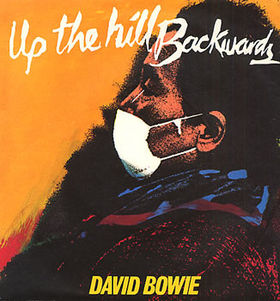
"Up the Hill Backwards" is a song by English musician David Bowie, released on his 1980 album Scary Monsters . It was later issued by RCA Records as the fourth and final single from the album in March 1981. Originally written under the title "Cameras in Brooklyn", the song was recorded between February and April 1980 at the Power Station in New York City and Good Earth Studios in London. The recording features backing vocalists, guitar contributions from Robert Fripp and acoustic guitar played by co-producer Tony Visconti. Lyrically, the song concerns the struggles of facing a crisis, partially influenced by Bowie's divorce from his wife Angie. Musically, the song contains numerous time signature changes and a Bo Diddley-inspired beat.

Mark Burgess is an English singer, bassist and songwriter, best known as the frontman of post-punk band the Chameleons.
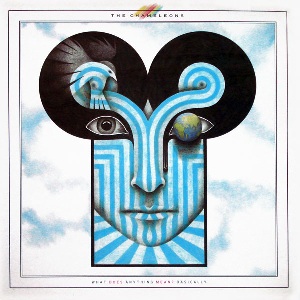
What Does Anything Mean? Basically is the second studio album by English rock band the Chameleons. It was recorded in January 1985 and released on 20 May 1985 by record label Statik.

Script of the Bridge is the debut studio album by English rock band the Chameleons. It was released on 8 August 1983 by record label Statik.

Why Call It Anything is the fourth and final album of original material and fifth studio album overall by English rock band the Chameleons. It was recorded from 2000 to 2001 and released 1 July 2001 on record label Artful. The album marked their first and only release of all-new material since the 1990 EP Tony Fletcher Walked on Water.... La La La La La-La La-La-La.

El Momento Siguiente is the 21st album by the Australian psychedelic rock band The Church and their second in the Liberation Acoustic Series, following 2005's El Momento Descuidado. The title translates from Spanish as "The Following Moment."

Whirlpool is the debut studio album by English shoegaze band Chapterhouse. It was released on 29 April 1991 by Dedicated Records.

Strip is the first acoustic album and fourth studio album overall by English rock band the Chameleons. It was released 1 May 2000 on record label Paradiso, following the band's reformation that year. It consists of acoustic arrangements of the Chameleons' previously released songs.

The Visitation is the debut studio album by American rock band Chrome. It was released in 1976 by Siren Records. In 2014, the album was re-released by Cleopatra Records with additional bonus tracks.
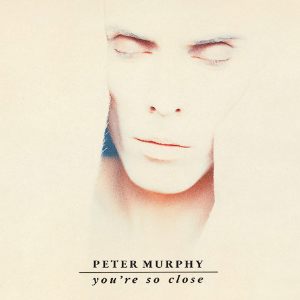
"You're So Close" is a song by English musician Peter Murphy, from his fourth solo studio album Holy Smoke (1992). Written by Murphy and Paul Statham, the song was released in 1992 as the second single from the album, through Beggars Banquet and RCA Records. Despite not matching with the success of the lead single off the album, "The Sweetest Drop", the song charted on Billboard Modern Rock Tracks, peaking at number 18.
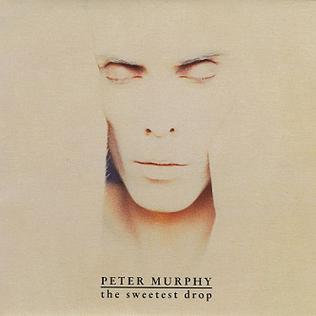
"The Sweetest Drop" is a song by English musician Peter Murphy, from his fourth solo studio album, Holy Smoke (1992). Written by Murphy and Paul Statham, the song was released as the lead single off the album in 1992, through Beggars Banquet and RCA Records. The album reached number 108 on the Billboard 200 chart, while the single peaked at number 2 on the Billboard Modern Rock Tracks chart.

Wire is the self-titled fourteenth studio album by British post-punk band Wire. It was released on 13 April 2015 through the band's Pinkflag label.

The Sun and the Moon is the debut studio album by English post-punk band the Sun and the Moon, featuring Mark Burgess and John Lever, released in 1988 by record label Geffen.




















